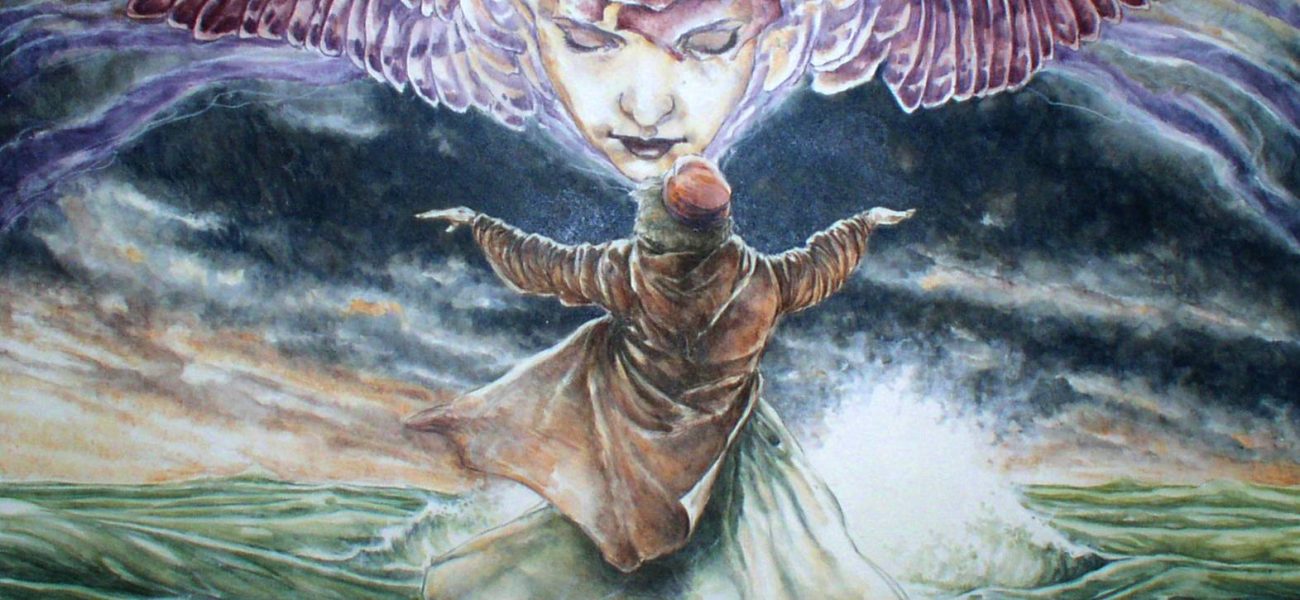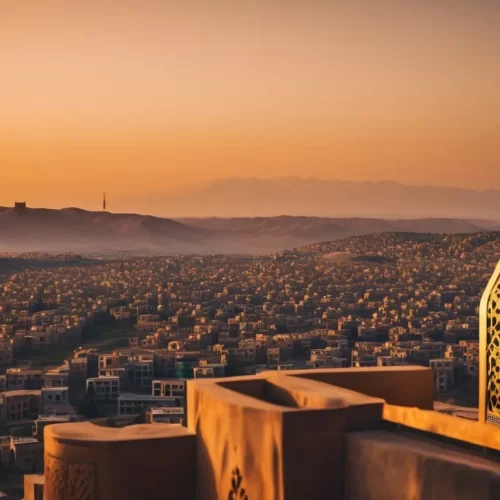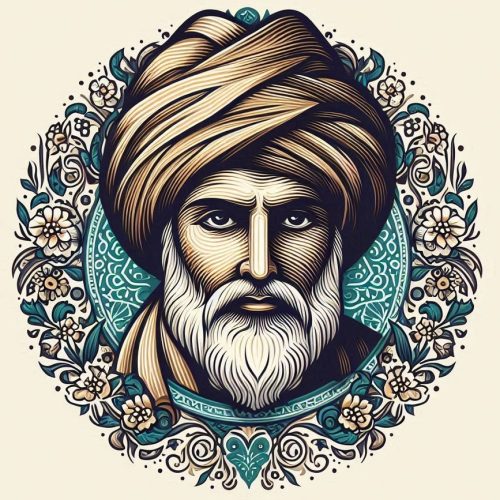In the annals of Persian mysticism, few figures loom as large as Mansour al-Hallaj. A poet, teacher, and spiritual guide, Hallaj’s life was a testament to the transformative power of Sufism – a mystical tradition that seeks union with the divine through love, devotion, and selflessness. His journey, marked by moments of ecstasy, tribulation, and transcendence, continues to inspire seekers of truth and wisdom to this day.
Early Years
In the humble beginnings of Mansour al-Hallaj’s life, the seeds of his spiritual journey were sown. Born into a world brimming with the scent of saffron and the echoes of prayers, Hallaj grew up in the ancient city of Fars, nestled amidst the rolling hills and fertile plains of Persia. From a young age, he exhibited a profound sensitivity to the mysteries of existence, often retreating to the quiet corners of his family’s home to contemplate the enigma of life and the unseen realms beyond.
In the golden light of dawn and the silver glow of moonlit nights, Hallaj would sit in silent communion with the divine, his heart ablaze with longing and his soul yearning for union with the Beloved. His parents, recognizing the depth of his spiritual fervor, nurtured his curiosity and encouraged him to seek knowledge and wisdom wherever it may be found.
As Hallaj entered adolescence, his thirst for spiritual truth grew ever more insatiable. He sought out the company of scholars, mystics, and wise men, eager to glean insights into the mysteries of the soul and the nature of ultimate reality. Under the guidance of his mentors, Hallaj delved into the teachings of Islam, delving into the depths of the Quran and the Hadith in search of divine wisdom and guidance.
But it was not only within the confines of formal religious study that Hallaj found inspiration. He was drawn to the natural world, with its boundless beauty and infinite variety, seeing in its wonders a reflection of the divine perfection. From the whispering breeze to the rustling leaves, from the song of the nightingale to the dance of the stars, Hallaj beheld the handiwork of God and felt his heart swell with gratitude and awe.
In the bustling streets of Fars, Hallaj encountered a tapestry of humanity, each thread woven with its own joys and sorrows, hopes and fears. He witnessed the struggles of the poor and oppressed, the injustices of the powerful and privileged, and felt a deep compassion stirring within his soul. He yearned to alleviate the suffering of his fellow beings, to offer them solace and support in their hour of need.
It was amidst this backdrop of spiritual seeking and social consciousness that Hallaj’s journey into Sufism began to take shape. He was drawn to the teachings of the mystics, with their emphasis on love, devotion, and selflessness as the keys to spiritual enlightenment. He sought out the company of Sufi masters, eager to learn from their wisdom and experience, and embarked on a journey of inner transformation and self-discovery that would forever alter the course of his life.
Thus, in the early years of Mansour al-Hallaj’s life, the seeds of his spiritual quest were planted, setting the stage for the extraordinary journey of self-realization and divine union that lay ahead. Little did he know that the path he had chosen would lead him to the heights of ecstasy and the depths of suffering, ultimately culminating in his martyrdom and his eternal union with the Beloved.
The Path of Sufism: A Journey of Self-Discovery and Divine Love

In Mansour al-Hallaj’s pursuit of spiritual truth, the path of Sufism beckoned with its promise of direct communion with the divine. Like a dervish drawn to the swirling rhythms of the Sufi dance, Hallaj embraced the teachings of this mystical tradition with fervor and dedication, recognizing in its practices and principles the keys to unlocking the secrets of the soul and attaining union with the Beloved.
Under the guidance of Sufi masters such as Junayd Baghdadi and Shibli Numani, Hallaj embarked on a journey of inner transformation and self-discovery that would take him to the farthest reaches of human consciousness and beyond. He immersed himself in the practices of dhikr (remembrance of God), meditation, and asceticism, seeking to purify his heart and purify his soul of all that stood between him and the divine.
In the solitude of the desert, amidst the shifting sands and the boundless expanse of sky, Hallaj found solace and inspiration in the contemplation of the natural world. He observed the ebb and flow of the tides, the cycle of birth and death in the plant and animal kingdoms, and saw in these phenomena the handiwork of the divine creator. Through the practice of tawhid (the unity of God), Hallaj sought to dissolve the illusion of separation and merge his consciousness with the infinite consciousness of the divine.
As Hallaj delved deeper into the mysteries of Sufism, he experienced moments of profound ecstasy and divine illumination. In states of ecstatic trance, he felt his ego dissolve and his soul merge with the ocean of divine love, experiencing a sense of unity and oneness with all of creation. These ecstatic experiences, known as “fana” (annihilation) and “baqa” (subsistence), became the cornerstone of Hallaj’s mystical path, guiding him along the path of divine realization and union.
But the path of Sufism was not without its challenges and trials. Hallaj faced resistance and opposition from orthodox religious authorities who viewed his teachings as heretical and dangerous. Despite the risks, he remained steadfast in his commitment to truth and love, refusing to compromise his integrity or renounce his beliefs in the face of persecution and adversity.
Through his unwavering dedication to the path of Sufism, Mansour al-Hallaj became a beacon of light and inspiration for seekers of truth and wisdom around the world. His teachings, rooted in the principles of love, compassion, and selflessness, continue to resonate with those who yearn for a deeper understanding of the divine and a closer connection to the source of all creation. In the words of Hallaj himself, “I am the one whose heart You have illumined with the light of Your love. I am the one who seeks union with You, O Beloved, in every breath and every heartbeat.”
The Ecstasy of Divine Union

In Mansour al-Hallaj’s spiritual journey, the pinnacle of his experiences came in moments of profound ecstasy and divine union. These experiences, which Hallaj often referred to as the “ecstasy of divine union,” were the culmination of years of spiritual practice, devotion, and surrender to the divine presence.
During his meditative practices and periods of deep contemplation, Hallaj would enter states of heightened awareness and consciousness, where the boundaries between the self and the divine would blur and eventually dissolve. In these transcendent moments, he felt an overwhelming sense of unity and oneness with the source of all existence, experiencing the divine presence as an ineffable reality that permeated every aspect of creation.
Hallaj’s ecstasy of divine union was characterized by a profound sense of love, bliss, and inner peace that transcended the limitations of the material world. He described feeling as though he was being drawn into the heart of God, enveloped in a divine embrace that filled him with a sense of joy and fulfillment beyond words.
In these states of ecstasy, Hallaj felt his individual self dissolve into the ocean of divine love, merging with the eternal presence of the Beloved. He experienced a sense of unity with all of creation, seeing himself reflected in the beauty of the natural world and feeling a deep sense of compassion and empathy for all living beings.
For Hallaj, the ecstasy of divine union was not simply a temporary experience or fleeting moment of transcendence. It was a state of consciousness that transformed his entire being, reshaping his understanding of reality and illuminating the path to spiritual liberation and enlightenment.
Through his ecstatic experiences, Hallaj became a living testament to the power of divine love to transcend the boundaries of ego and unite humanity with the source of all creation. His teachings and poetry, infused with the fire of divine passion, continue to inspire seekers of truth and wisdom to this day, inviting them to embark on their own journey of self-discovery and divine union.
The Language of Love

In delving into the life and teachings of Mansour al-Hallaj, we encounter a profound exploration of the language of love – a language that transcends the boundaries of words and concepts, speaking directly to the heart and soul of the seeker. Throughout his mystical journey, Hallaj employed the language of love as a powerful tool for expressing his deepest spiritual insights and experiences, inviting others to join him on the path of divine union and self-realization.
At the heart of Hallaj’s teachings is the notion of divine love – a love that surpasses all earthly attachments and desires, binding the soul to the eternal source of all existence. Through his poetry and prose, Hallaj painted vivid images of the Beloved, evoking feelings of longing, devotion, and surrender in the hearts of his listeners.
In Hallaj’s verses, the Beloved is depicted as a radiant sun, whose light illuminates the darkest corners of the soul and fills the heart with warmth and joy. The seeker, like a moth drawn to the flame, is irresistibly drawn to the divine presence, yearning to be consumed by the fire of divine love and united with the Beloved for eternity.
Hallaj’s poetry is replete with images of the lover and the beloved, the seeker and the sought, engaged in a dance of divine longing and union. Through his lyrical verses, he captures the essence of the mystical journey – a journey marked by moments of ecstasy, surrender, and self-transcendence.
But Hallaj’s language of love is not confined to mere words on a page. It is a living, breathing expression of the soul’s deepest yearnings and aspirations, a call to awaken to the reality of divine love that dwells within each and every human heart. Through his poetry and teachings, Hallaj invites us to embark on a journey of self-discovery and transformation, to open our hearts to the infinite possibilities of divine love, and to surrender ourselves completely to the will of the Beloved.
In embracing the language of love, Mansour al-Hallaj invites us to transcend the limitations of the ego and experience the boundless beauty and majesty of the divine presence. Through the power of love, we are invited to unite with the Beloved and become vessels of divine grace and illumination, shining forth as beacons of light and love in a world hungry for spiritual nourishment and guidance.
Trials and Tribulations
In the turbulent currents of Mansour al-Hallaj’s life, the trials and tribulations he faced were as formidable as they were transformative. As his teachings and experiences of divine ecstasy began to gain attention and influence, Hallaj found himself increasingly at odds with the religious establishment and the orthodoxy of his time.
Opposition to Hallaj’s teachings arose from multiple quarters, including religious scholars, jurists, and those in positions of religious authority. His radical ideas and unorthodox practices were viewed as heretical deviations from mainstream Islamic doctrine, and he soon became the target of suspicion and condemnation.
Despite his unwavering commitment to truth and love, Hallaj’s outspokenness and refusal to conform to societal norms made him a controversial figure. His bold declarations of divine union, often expressed in poetic and metaphorical language, were interpreted by some as blasphemy and a challenge to the established order.
In the face of mounting pressure and persecution, Hallaj remained steadfast in his convictions, refusing to renounce his beliefs or compromise his integrity. He continued to preach the message of divine love and unity, even as his detractors sought to silence him through intimidation and violence.
The turning point in Hallaj’s life came with his arrest and subsequent trial on charges of blasphemy and heresy. Despite mounting a spirited defense and pleading for mercy, he was ultimately convicted and sentenced to death by crucifixion. The news of his impending execution sent shockwaves throughout the Islamic world, sparking widespread debate and controversy over the nature of his teachings and the justice of his punishment.
In the final moments before his martyrdom, Hallaj remained resolute in his faith and unwavering in his commitment to truth and love. As he faced his executioners with a serene smile and words of forgiveness on his lips, he embodied the essence of divine love and self-sacrifice, transcending the confines of earthly existence and ascending to the realm of eternal truth and union with the Beloved.
Though Mansour al-Hallaj’s physical life came to an end on the executioner’s scaffold, his legacy endured, inspiring generations of seekers to embrace the path of divine love and self-realization. His teachings, recorded in his poetry and spiritual treatises, continue to serve as a beacon of light and guidance for all who seek to unlock the secrets of the soul and experience the boundless beauty and majesty of the divine presence.
The Martyrdom of Divine Love
The Martyrdom of Divine Love stands as a pivotal moment in the life of Mansour al-Hallaj, a moment where his unwavering commitment to truth and love intersected with the harsh realities of religious orthodoxy and societal intolerance. It was a moment of profound spiritual significance, where Hallaj’s earthly existence merged with the eternal realm of divine truth and union.
As Hallaj faced his impending execution, his demeanor radiated a serene calmness and an unwavering resolve, emblematic of his profound faith and inner conviction. Despite the severity of his circumstances, he bore no bitterness or resentment towards his persecutors, instead embodying the spirit of forgiveness and compassion that lay at the heart of his teachings.
In the moments leading up to his martyrdom, Hallaj’s thoughts turned not to his own suffering, but to the transformative power of divine love and the eternal truths that he had dedicated his life to proclaiming. He saw his impending sacrifice not as a tragedy, but as a testament to the enduring power of faith and the unyielding nature of spiritual truth.
As the executioner’s blade fell and Hallaj’s earthly journey came to an end, his spirit soared to new heights of transcendence and illumination. In that final moment of surrender, he became one with the Beloved, his soul merging with the infinite ocean of divine love and wisdom.
The martyrdom of Mansour al-Hallaj was not simply the tragic end of a life cut short; it was a profound affirmation of the enduring power of divine love to transcend the limitations of the material world and unite humanity with the source of all existence. In his martyrdom, Hallaj became a symbol of spiritual resilience and unwavering faith, inspiring countless generations to embrace the path of divine love and self-realization. His legacy endures as a beacon of light and guidance for all who seek to unlock the secrets of the soul and experience the boundless beauty and majesty of the divine presence.
Legacy and Influence
Mansour al-Hallaj’s legacy transcends the boundaries of time and space, permeating the realms of literature, spirituality, and mysticism with his profound insights and unwavering commitment to divine love. Despite facing persecution and martyrdom, Hallaj’s teachings continued to resonate with seekers of truth and wisdom long after his passing, leaving an indelible mark on the history of Sufism and Islamic mysticism.
One of the most enduring aspects of Hallaj’s legacy is his poetry, which remains as vibrant and relevant today as it was centuries ago. His verses, infused with the fire of divine passion and the longing for union with the Beloved, continue to inspire and uplift readers around the world, inviting them to embark on their own journey of self-discovery and spiritual transformation. Through his poetry, Hallaj invites us to transcend the limitations of the ego and experience the boundless beauty and majesty of the divine presence that dwells within us all.
In addition to his literary contributions, Hallaj’s teachings on divine love and union have had a profound impact on the development of Sufi philosophy and theology. His radical ideas challenged conventional notions of religious orthodoxy and paved the way for a more inclusive and expansive understanding of Islam and spirituality. Hallaj’s emphasis on the universality of divine love and the inherent unity of all creation continues to inspire Sufi practitioners and scholars to this day, fostering a deeper appreciation for the mystical dimensions of Islamic thought and practice.
Furthermore, Hallaj’s martyrdom serves as a powerful symbol of spiritual resilience and unwavering faith in the face of adversity. His willingness to endure suffering and persecution for the sake of truth and love has inspired countless individuals to stand up for their beliefs and remain steadfast in the face of oppression. Hallaj’s martyrdom is a reminder that the pursuit of spiritual truth often requires courage, perseverance, and self-sacrifice, and that the ultimate reward lies in the eternal embrace of the Beloved.
Mansour al-Hallaj’s legacy is one of profound spiritual insight, literary brilliance, and unwavering devotion to divine love. His teachings continue to inspire and uplift seekers of truth and wisdom across the globe, inviting them to embark on a journey of self-discovery and spiritual transformation. Through his poetry, philosophy, and martyrdom, Hallaj remains a timeless symbol of the enduring power of faith, love, and sacrifice in the quest for divine union.




